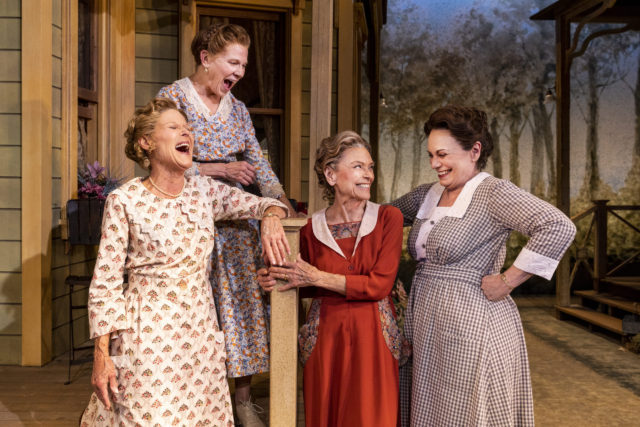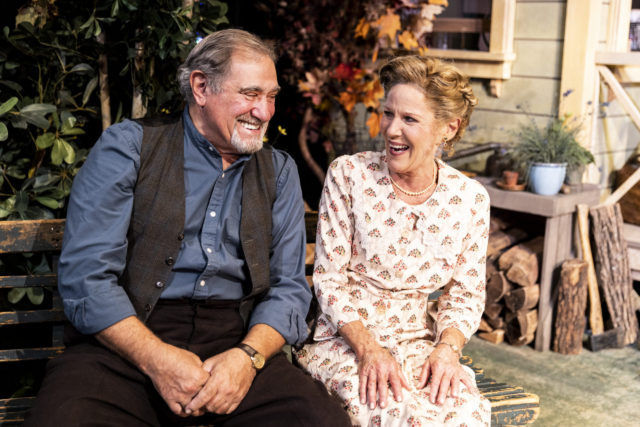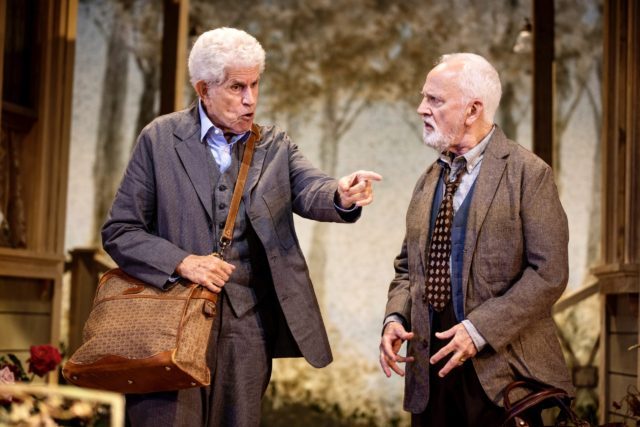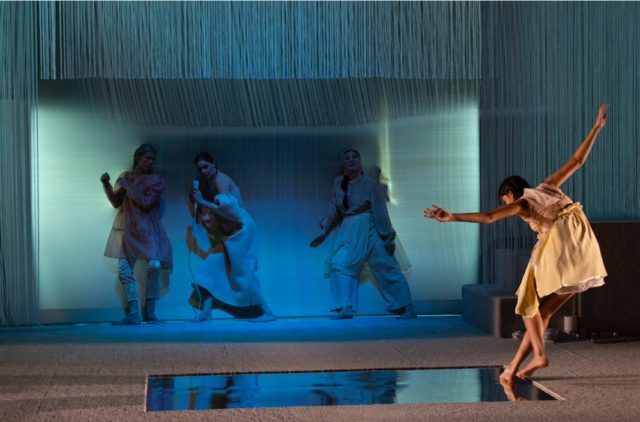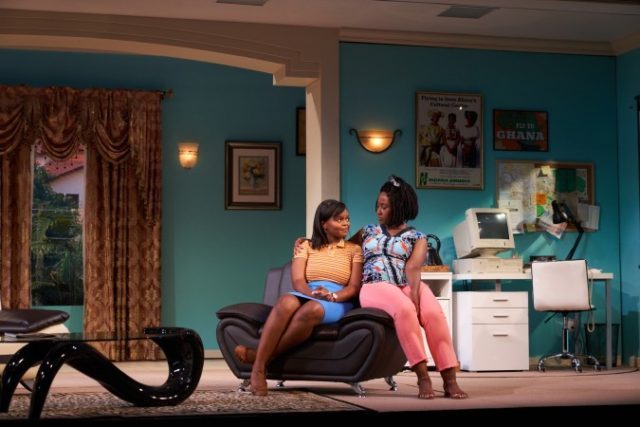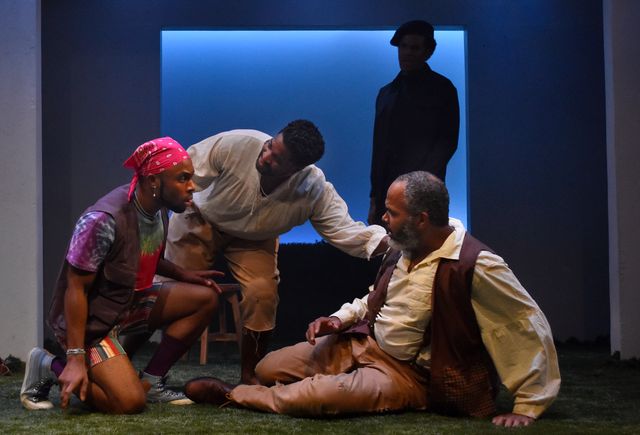
A tight-knit family of five women battle the Flint water crisis in world premiere at the Public (photo by Joan Marcus)
CULLUD WATTAH
Martinson Theater, the Public Theater
425 Lafayette St. at Astor Pl.
Tuesday through Sunday through December 12, $40-$150
212-539-8500
publictheater.org
“You are free to bear collective witness & be collectively witnessed,” Erika Dickerson-Despenza writes in a program note to her extraordinary Cullud Wattah, continuing through December 12 at the Public’s Martinson Theater. The play is a powerful call to action inside a harrowing drama about one of humanity’s most basic needs: clean water. As you enter the space, you are met by hundreds of plastic bottles filled with dirty brown water, lining the stage and hanging from the ceiling, a forest of sickness that resembles a mass lynching.
Nine-year-old Plum (Alicia Pilgrim) is adding tally marks in chalk to the wall, tracking how many days it’s been since the city of Flint, Michigan, has been without clean drinking water. For years, their water has been tainted by lead, which Michigan governor Rick Snyder and GM were well aware of — but both government and corporation chose profit over public health. Plum makes her way into a bathtub at the front of the stage as she is joined by her mother, Marion (Crystal Dickinson), her seventeen-year-old sister, Reesee (Lauren F. Walker), her aunt, Ainee (Andrea Patterson), and her grandmother, Big Ma (Lizan Mitchell). The five women, four dressed in white, looking like ghosts, sing a spiritual while gathering in a type of ritual procession: “lead/ in thuh wattah/ lead/ in thuh wattah cheeldrun/ lead/ in thuh wattah/ snyder playin god/ with wattah.”
The play is set in Michigan’s fifth ward, Genessee County, in the fall of 2016, five years ago to the day. It takes place in the home of the Coopers, their house suggested by a set with no walls and only a partial ceiling. (The stunning design is by Adam Rigg, the costumes by Kara Harmon.) In the script, Dickerson-Despenza explains that the form and structure “are fundamental components of an artistic aesthetic & political instrument the playwright calls ‘jook joint writing’: a radical, subversive practice that dis/orders linguistic (neo)colonialism & imperialism, building vernacular without walls.” The characters move throughout the space with a rhythm that the outside world forbids.

Playwright Erika Dickerson-Despenza, director Candis C. Jones, and actress Crystal Dickinson rehearse Cullud Wattah (photo by Joan Marcus)
Marion is a widowed third-generation assembly-line worker at GM, trying to keep her job amid layoffs. Her older sister, Ainee, an addict survivor who is prepared to fight for change, is thirty-four weeks pregnant and worried that she will lose this baby as she has several before. Reesee wants to be a doula and a dancer and is immersed in Yoruba culture. Plum is battling illness, concerned for her immediate future. And Big Ma is trying to hold it all together. “White folks’ll take this house n flip it for a million once this whole lead thing is ovah,” she says. As word of a potential strike at the plant spreads, Marion and Ainee are at odds that could cause a rift in this tight-knit family of strong women.
Although Cullud Wattah is not part of Susan Smith Blackburn Prize winner Dickerson-Despenza’s planned ten-play Katrina Cycle, which includes the superb [hieroglyph] and the compelling radio play shadow/land, it features similar themes, exploring the intersection between water, race, and politics. References to liquids as a life-giving (and life-taking) force abound throughout the play. Ainee says that the baby in her womb is “doin wattah aerobics.” Reesee prays to Yemoja, the Yoruba water deity. Blood and piss figure prominently. The title itself can be read in several ways, from referring to the color of the water in the bottles to foul water that has been served to Black families.
Elegantly directed by Candis C. Jones (Pipeline, shadow/land), Cullud Wattah might specifically be about the Flint lead crisis but also recalls the history of whites-only water fountains and segregated pools in America; racism and colonialism are embedded in the play’s bones without Dickerson-Despenza having to stress them. Inspired by the works of Zora Neale Hurston, Toni Morrison, Toni Cade Bambara, Ntozake Shange, and Suzan-Lori Parks, the playwright keeps the audience on edge for all 110 minutes, with a stellar cast led by Dickinson (Why Would I Dare: The Trial of Crystal Mason, You Can’t Take It with You, The Low Road) as a widowed mother willing to go to extreme lengths to support her family and Mitchell (Here Is Future: The Transformed Returns, Passage, shadow/land) as the matriarch who says exactly what she thinks.
Discussing the loss of Marion’s husband in the Afghanistan war, Big Mama says, “He provided for his family by any means necessary/ there’s money in war,” to which Marion responds, “There are wars in money mama/ too many to count.” As the play reminds us at the very end, there’s still a war going on in Flint over money and water, swiftly approaching its twenty-eight-hundredth day.
[Note: For more on the play, you can watch a conversation between Dickerson-Despenza and Jones here.]


